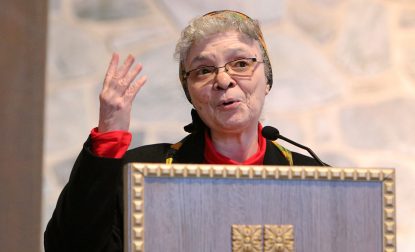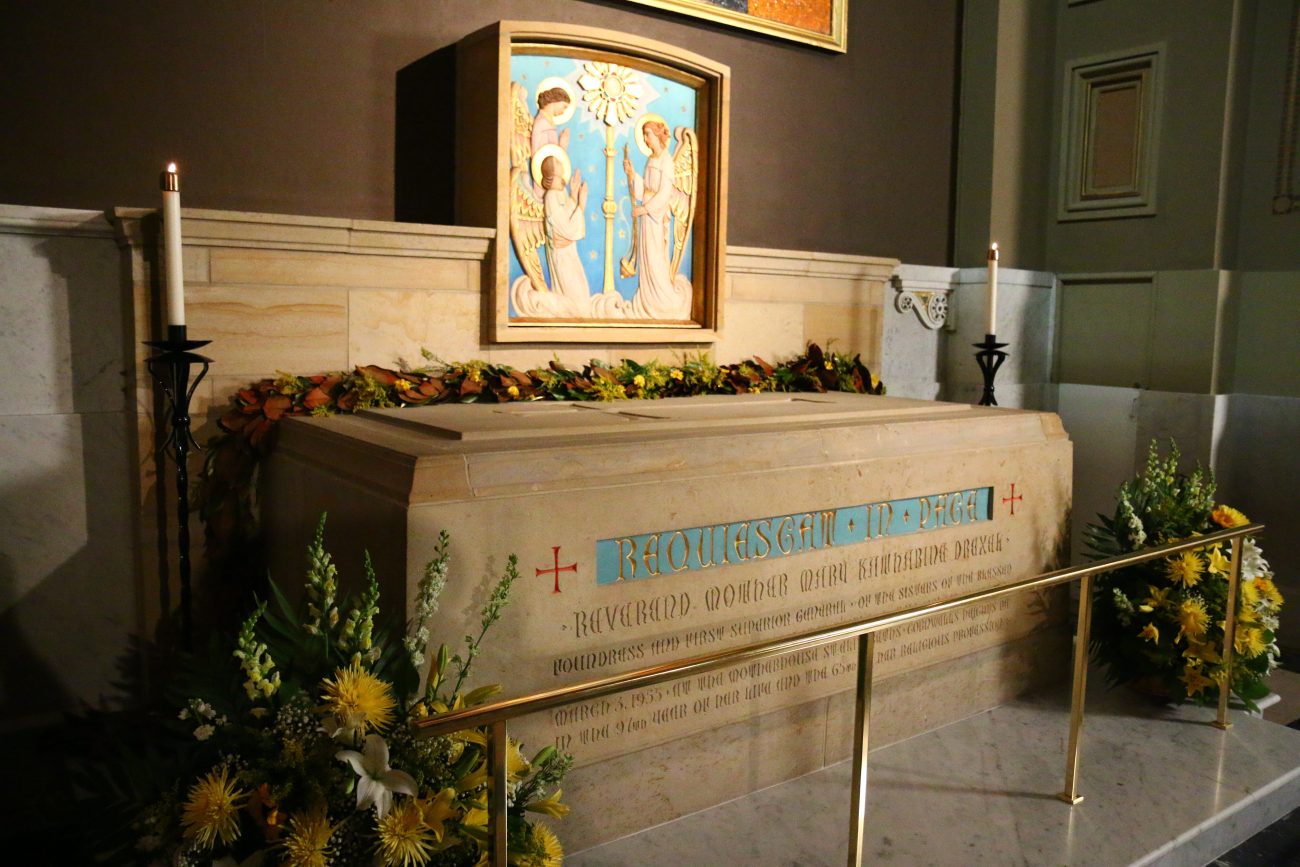Like many Catholics year-round, and especially as the Solemnity of the Most Holy Body and Blood of Christ (formerly known as Corpus Christi) approaches on June 22, Sister Stephanie Henry often finds herself praying before and adoring the Blessed Sacrament.
Unlike most Catholics, her devotion to the Lord through eucharistic adoration literally has led her to become one of the Sisters of the Blessed Sacrament. The Philadelphia native is the president of that religious order.
Just like Sister Stephanie, the order’s founder was a Philadelphian whose devotion centered around the Eucharist and led her to reach out to people on the margins of the city, the country and the world to embody Christ’s love.
That founder was St. Katharine Drexel, whose mortal remains rest inside the Cathedral Basilica of SS. Peter and Paul in Center City Philadelphia and whose 25th anniversary of canonization is being celebrated this year.
“If we listen to, or observe, the life and witness of St. Katharine Drexel, it was about giving herself in service of others,” Sister Stephanie said.
She added that the saint focused much of her ministry in the late 19th and early 20th century on the Black and Native American communities of Philadelphia and America, a woman considered by many Catholics to be the patron saint of social responsibility.
“The source of giving herself to others was her love of Jesus in the Eucharist, and she knew that love was intended for all, and that all God’s people were to be invited around the table. I think that’s a message for the whole Church.”
Sister Stephanie also embodies a charism similar to that of St. Katharine Drexel, one that boldly and passionately offers what the religious order’s motto states is “Total Gift of Self.”
“That boldness would have to come from the Holy Spirit, but to be animated by the Spirit, I think you have to be willing to — as an African-American song (says) — ‘Just forget about yourself, concentrate on him and worship him.’ That was Katharine Drexel’s understanding of what Eucharist was about. Jesus totally gave himself,” she said.
“For love of the One who totally gives of himself, the one who is truly following Jesus or falling in love with Jesus (and) wants to be like him and do the same thing, and that’s to be for others.”
She suggested that living a life centered in the Eucharist while reaching out to the edges and emptying oneself in love like St. Katharine did invites one into a practice of refueling with the Lord’s very presence.

Sister Stephanie Henry, SBS, offers the Gospel reading and reflection during the annual archdiocesan MLK Interfaith prayer service, Jan. 15, 2023. (Sarah Webb)
Sister Stephanie learned early on, before she entered the Sisters of the Blessed Sacrament, that finding sacred spaces like adoration for spiritual rejuvenation is critical.
“Oftentimes in our lives, in our general workaday, whether we’re at work or with families, we’re so busy taking care of business that we aren’t recognizing — and maybe we can’t in that moment recognize — the presence of the Lord because of the physical need right before us. In that moment, that’s all you’re focused on,” she said.
“Adoration is a time for quieting down, a time to remember the words of Jesus, ‘I am with you always,’ a time to remember the words of institution of the most holy sacrament, ‘This is my body, this is my blood.’ We have the gift of the Real Presence, and we need to avail ourselves of going to the Lord and waiting to be touched.”
Through her decades of devotion through Adoration, she reflects how the Blessed Sacrament within particular types of monstrances deeply reflect how Jesus reached out to everyone, including the edges of society, with perfect and unending love.
“In many monstrances, the vessel in which the Blessed Sacrament is exposed has radiating spokes,” Sister Stephanie said.
“That can be a reminder of God’s radiant love flowing out in all directions, not just in one plane. The rays go out around in a flat plane, but it’s going out in all directions, the globe. That’s God’s love.”
Like those rays of a monstrance, the love of the eucharistic Lord should “illuminate,” Sister Stephanie said, “the encounters of our day” and help us to realize “that the radiance of Christ not only flows from us to others, but from others to us.”
The never-ending cycle of divine praise and loving action continues for us as it did for St. Katharine Drexel, or as Sister Stephanie said, it is “a time of saying, ‘Yes, Lord, I want you. I want to be open to your will.’”
PREVIOUS: Eight Men to be Ordained Permanent Deacons June 14
NEXT: Elementary Education Leader Honored with Awards



Share this story